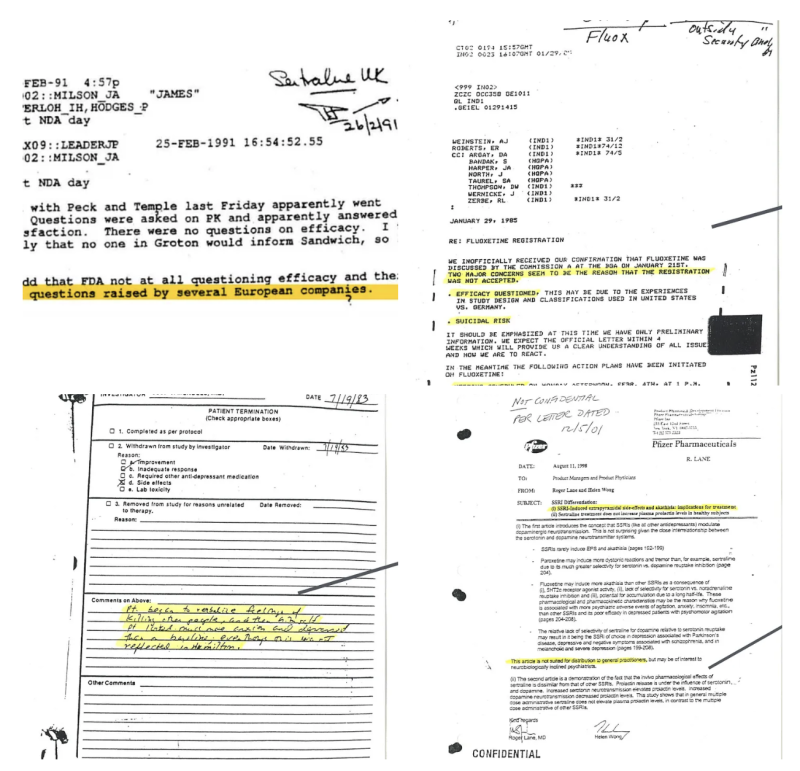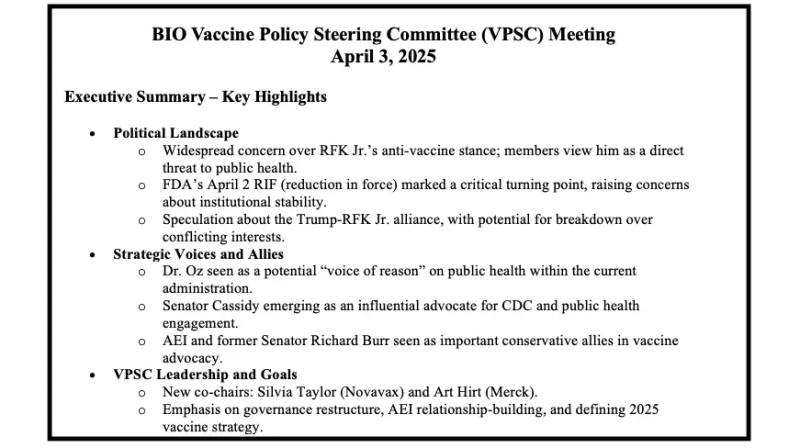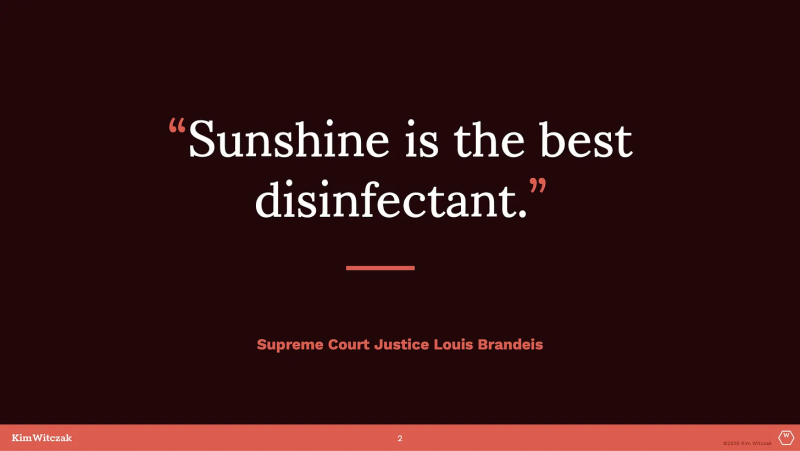The Documents Speak. And They Tell a Very Different Story.
by Kim Witczak at Brownstone Institute
When my husband Woody died by suicide in 2003, nothing made sense.
Everyone around me said the same thing: “He must have been depressed.”
But I lived with him. I knew him. And in the deepest part of me, that explanation didn’t fit.
Woody was outgoing, high-functioning, driven, and fully engaged in life. He was training for a marathon, logging his miles, showing up for work, and showing up for us. He wasn’t withdrawn or struggling in the ways people typically associate with depression.
The only thing that had changed was that, five weeks earlier, his doctor prescribed him Zoloft—an antidepressant—for insomnia due to his new dream job with a start-up company.
That was it.
We didn’t know much about antidepressants then. But after Woody died, we started digging. And what we found was shocking. One discovery led to another. We began connecting the dots. Ultimately, it led us to file a wrongful death/failure to warn lawsuit against Pfizer.
What we uncovered during that legal process changed everything.
Internal documents. Emails. Memos. Strategy decks. Marketing plans. Risk assessments. Quiet acknowledgments of harm.
All buried inside the system.
All on company and FDA letterhead.
All never meant for public eyes.
That’s when I learned one of the most sobering truths of my life:
Truth often doesn’t come from the doctor’s office or the stories we’re told. It lives in the documents—in black and white, behind closed doors.
Documents don’t lie—they expose.
Once you’ve looked behind the curtain, you see it clearly: the system runs on spin, shields power, and protects profit—not people.


The BIO Leaked Memo: “It’s Time for RFK Jr. to Go.”
So when I read this article by James Lyons-Weiler for Brownstone Institute—a think tank I’ve come to respect for its commitment to questioning powerful systems and fostering honest dialogue—about the leaked BIO memo, where a pharmaceutical lobbying group discussed quietly removing RFK, Jr. and shaping public sentiment, I didn’t need convincing.
I’ve seen this before.
The names change.
But the machinery doesn’t.

The leaked internal document—reportedly from Biotechnology Innovation Organization (BIO), the powerful lobbying arm of the pharmaceutical industry—had just come to light. And when I read the April 3, 2025 steering committee document, it was déjà vu all over again.

Because it said the quiet part out loud:
“It is time to go to The Hill and lobby that it is time for RFK Jr. to go…”
Not because of policy disagreements. But because he posed a threat—to the business model. To public scrutiny. To transparency.
The memo outlined a strategic roadmap, naming “influential voices,” outlining investor fears, identifying messaging tactics, and spotlighting political allies like former FDA commissioner (now Pfizer board member) Scott Gottlieb and CMS Administrator Dr. Oz. As someone with a career in advertising and marketing, I recognized the blueprint instantly.
On one level, BIO was simply doing its job as a trade group protecting their clients’ interests. But on another, it reveals how calculated and controlled the public narrative can be, especially when profits and control are at stake.
This wasn’t about protecting science or public health.
This was about managing perception, neutralizing dissent, and maintaining their political capital.
This post isn’t about defending RFK, Jr. or debating the politics of the FDA or NIH. It’s not about red or blue. It’s about something deeper—and far more dangerous: how far industry will go to protect its pockets and control the narrative, no matter who’s in charge.
If you’ve followed my work, you know I’ve always said healthcare isn’t a partisan issue.
It’s purple—for people. For the unsuspecting public, like we were almost 22 years ago.
The Campaign Wasn’t Public Health. It Was Public Relations.
And the BIO memo isn’t the only example of this. There’s another document, obtained through a Freedom of Information Act (FOIA) request, that paints a similar picture. It wasn’t a science-led health strategy. It was a nationwide messaging campaign, designed not to support informed choice or foster open conversation, but to shape public behavior while shutting down questions and debate.
We were told public health messaging during Covid was about “following the science.” But what this FOIA-obtained document from Judicial Watch reveals is something very different:
A strategic communication campaign designed to shape perception, influence behavior, and saturate culture through entertainment and media—not evidence-based health dialogue.
Highlights from the internal HHS Public Education Plan included:
- Vaccine “engagement packages” sent to entertainment talent and media agencies
- Recruitment of late-night hosts, Hollywood comedy writers, and scripted TV shows
- Partnerships with TikTok, Snapchat, and Instagram influencers
- Specials on Christian Broadcast Network and live TV programs like The Voice
- Messaging amplified by the NFL, NASCAR, MLB, Disney Parks, and more
- Algorithm-boosted content created with social media platforms
What that document reveals is not a public health education campaign. It’s a coordinated psychological marketing blitz. It read like a global brand campaign rollout, except the “product” was a government-endorsed vaccination one-size-fits-all program. And the goal wasn’t informed consent. It was compliance.
Every cultural and emotional lever was pulled. And unless you dug through FOIA documents like this one…you’d never know.
And again, this isn’t about being “anti-vax” or “pro-vax.” It’s about being pro-truth, pro-transparency, and pro-human choice.
I come from advertising. I know what a campaign strategy looks like.
And this? This was one of the most aggressive PR blitzes I’ve ever seen.
The fact that it had to be uncovered through FOIA says everything.
If this was truly about public trust, why wasn’t it public to begin with?

From Where I Stand
I’m not anti-medicine. I’m not anti-business. And I’m certainly not anti-progress.
I believe in innovation. I believe in transformation. I love what business can do when it’s aligned with purpose and integrity.
But I also believe in transparency over spin, and people over profit.
Because when it comes to healthcare, we’re dealing with human lives—not products, not campaigns, not quarterly gains.
And yet, healthcare remains one of the only industries where we’re taught to blindly trust and obey. No questions. No pushback. Just compliance.
We give our power away—because we believe “they” know better.
But here’s what I’ve learned through grief, advocacy, and the hard road of truth-finding:
No one will ever care more about your health or your loved one’s life than you.
And documents like these—whether uncovered through lawsuits, FOIA, or brave insiders—are the breadcrumbs we need to follow.
They don’t lie.
They don’t spin.
They just show us the parts of the story we were never meant to see.
A Final Thought
The truth doesn’t need to be protected. It needs to be revealed. And more often than not, the documents are where that truth lives.
Let’s stay curious. Stay awake.
And never stop asking…
What are we not being told?
Republished from the author’s Substack
The Documents Speak. And They Tell a Very Different Story.
by Kim Witczak at Brownstone Institute – Daily Economics, Policy, Public Health, Society
Author: Kim Witczak
This content is courtesy of, and owned and copyrighted by, https://brownstone.org and its author. This content is made available by use of the public RSS feed offered by the host site and is used for educational purposes only. If you are the author or represent the host site and would like this content removed now and in the future, please contact USSANews.com using the email address in the Contact page found in the website menu.








